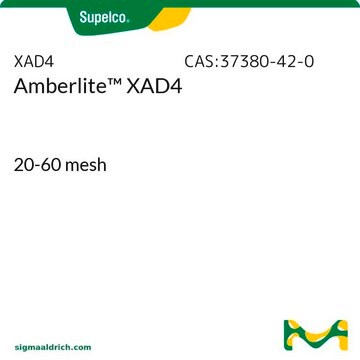15200
Bis[3-(triethoxysilyl)propyl] tetrasulfide
technical, ≥90% (NMR)
Synonym(s):
TESPTS, 3,3′-Tetrathiobis(propyl-triethoxysilane)
Sign Into View Organizational & Contract Pricing
All Photos(1)
About This Item
Empirical Formula (Hill Notation):
C18H42O6S4Si2
CAS Number:
Molecular Weight:
538.95
Beilstein:
2062235
EC Number:
MDL number:
UNSPSC Code:
12352103
PubChem Substance ID:
NACRES:
NA.22
Recommended Products
grade
technical
Quality Level
Assay
≥90% (NMR)
form
liquid
refractive index
n20/D 1.49
density
1.08 g/mL at 20 °C (lit.)
functional group
tetrasulfide
trisulfide
SMILES string
CCO[Si](CCCSSSSCCC[Si](OCC)(OCC)OCC)(OCC)OCC
InChI
1S/C18H42O6S4Si2/c1-7-19-29(20-8-2,21-9-3)17-13-15-25-27-28-26-16-14-18-30(22-10-4,23-11-5)24-12-6/h7-18H2,1-6H3
InChI key
VTHOKNTVYKTUPI-UHFFFAOYSA-N
Application
Bis[3-(triethoxysilyl)propyl] tetrasulfide (TESPTS) is generally used as a crosslinking agent and reinforcing filler in the manufacturing of rubber. TESPT film provides corrosion protection to the metallic substrates. It is also used as a precursor in the synthesis of mesoporous organosilicas.
Storage Class Code
10 - Combustible liquids
WGK
WGK 1
Flash Point(F)
212.0 °F - closed cup
Flash Point(C)
100 °C - closed cup
Personal Protective Equipment
dust mask type N95 (US), Eyeshields, Gloves
Choose from one of the most recent versions:
Already Own This Product?
Find documentation for the products that you have recently purchased in the Document Library.
Customers Also Viewed
Thioether-bridged Mesoporous Organosilicas: Mesophase Transformations Induced by the Bridged Organosilane Precursor.
Liu, et al.
Advances in Functional Materials, 17(4), 569-576 (2007)
Elkid Cobani et al.
Nanomaterials (Basel, Switzerland), 9(4) (2019-04-03)
Sepiolite (Sep)⁻styrene butadiene rubber (SBR) nanocomposites were prepared by using nano-sized sepiolite (NS-SepS9) fibers, obtained by applying a controlled surface acid treatment, also in the presence of a silane coupling agent (NS-SilSepS9). Sep/SBR nanocomposites were used as a model to
Yan He et al.
Colloids and surfaces. B, Biointerfaces, 187, 110653-110653 (2019-12-04)
Chlorhexidine (CHX) is a widely used antiseptic in various infection control practices. In this work, we have developed biodegradable mesoporous organosilica nanoparticles (MONs) through a one-pot synthesis by employing CHX as a bifunctional agent that not any acts as a
Kumarjyoti Roy et al.
Polymers, 12(2) (2020-02-13)
In the present study, the suitability of various chemical treatments to improve the performance of jute fibers (JFs) filled natural rubber (NR) composites was explored. The surface of JFs was modified by three different surface treatments, namely, alkali treatment, combined
Bo Chen et al.
Scientific reports, 5, 9017-9017 (2015-03-13)
There is no effective strategy for the treatment of spinal cord injury (SCI). An appropriate combination of hydrogel materials and neurotrophic factor therapy is currently thought to be a promising approach. In this study, we performed experiments to evaluate the
Our team of scientists has experience in all areas of research including Life Science, Material Science, Chemical Synthesis, Chromatography, Analytical and many others.
Contact Technical Service










